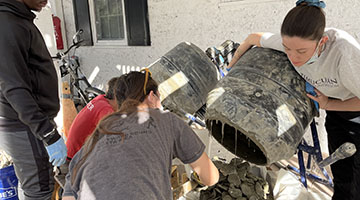UNF students are helping restore shoreline at Kingsley Plantation
 The University of North Florida students and the National Park Service’s Timucuan Ecological and Historic Preserve rangers teamed up with the Timucuan Parks Foundation (TPF) Trail Team volunteers to help stabilize the shoreline and restore habitats at Kingsley Plantation. The volunteers are building and repairing reef molds made from recycled oyster shells.
The University of North Florida students and the National Park Service’s Timucuan Ecological and Historic Preserve rangers teamed up with the Timucuan Parks Foundation (TPF) Trail Team volunteers to help stabilize the shoreline and restore habitats at Kingsley Plantation. The volunteers are building and repairing reef molds made from recycled oyster shells.
The reef molds, known as previous oyster shell habitat modules, or POSH modules, were invented by UNF biology professor Dr. Kelly Smith and her UNF research team and positioned along the shoreline at Kingsley Plantation last year. The POSH modules are designed to give oysters a place to attach and thus work to restore the habitats along the shoreline that have seen increased deterioration due to boat traffic and severe storms. UNF’s unique design uses recycled oysters and minimal cement content to minimize the carbon footprint.
The oysters, a critical component of the area’s ecosystem, work as a water filtration system and help improve water quality. The reefs help protect fish and provide food for native wildlife. This shoreline restoration project protects wildlife and plants and ensures the shoreline is resilient to rising sea levels and climate change dangers.
“Projects and partnerships, like this, are critical to maintaining and protecting the natural environments in our wilderness parks and preserves,” said Felicia Boyd, TPF program and outreach director.
Timucuan Park Foundation’s Trail Team is made up of a core group of volunteers who work each week on maintenance, restoration, and cleanup projects throughout the more than 25 wilderness parks and preserves in Jacksonville that TPF supports. Those interested in volunteering with the Trail Team can visit www.timucuanparks.org.
